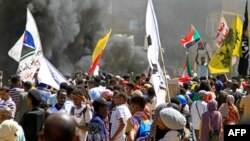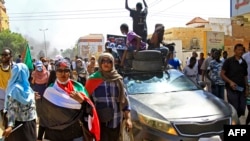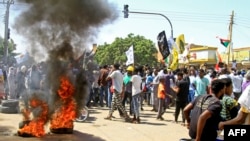A doctor’s group said one protester was killed during demonstrations marking one year of military rule in Sudan as security forces used tear gas on the crowds.
Thousands protested in cities across the country Tuesday under yet another internet blackout.
The Central Committee of Sudan Doctors said one protester was killed in Omdurman, a city across the Nile River from Khartoum, after being hit by a tank, and three others were wounded.
Since army chief Abdel Fattah al-Burhan seized power, Sudan has seen near-weekly anti-coup rallies and crackdowns by security. The doctors committee said the death toll from rallies over the past year stood at 119.
In Khartoum, scores of youths marched toward the presidential palace, listening to revolutionary songs and poems. Police used tear gas and water trucks to disperse them as they tried to enter the palace.
Protester Abdulhaleem al-Sheikh said life under military rule had crippled Sudan’s development.
He said the economy, health and education had all deteriorated. Sudan also lost a lot of money from the International Monetary Fund, he said.
Sudan was to receive nearly $50 billion in debt relief from Western creditors and billions more in funding. But the U.S., the World Bank, the International Monetary Fund and other lenders suspended those plans after last October's coup.
Al-Burhan took power from the transitional shared-power government headed by former Prime Minister Abdallah Hamdok, who was detained along with other civilian ministers. They were released after Hamdok signed a political agreement with the military in November. He resigned in January.
Still hopeful
Protester Ahmed Abdulwahab said he was still hopeful that democratic change would come to Sudan.
He said the country was promised a democratic transition and that citizens hoped God would support them. "We need to see development in our country," he said, "and we should complete what our former Prime Minister Abdallah Hamdok started."
Human Rights Watch released a statement on the anniversary, calling on Sudan’s military leaders to respect peaceful protest and restore democratic rule.
Mohammed Osman, a Sudan researcher at Human Rights Watch, said security forces had committed a range of abuses, from killings to arbitrary detentions of hundreds of people.
“Over the last year, Sudan’s military leaders have faced no consequences for their repression of the protest movement," Osman said. "As protesters once again bravely take to the streets in the coming days, the world should stand behind their demands for a rights-respecting future and make clear that impunity for the ongoing serious crimes, including at the highest level, will not be accepted.”
Sudanese police issued a statement Tuesday night accusing some protesters of being armed but providing no evidence.
Despite the force against them, a Khartoum protester who identified herself as Rania said they would keep demonstrating.
She said a year had passed and the country had achieved nothing, "but we are still hopeful that good days are coming, and we should not give up. We need to see that justice is achieved for our martyrs."
U.N. independent rights experts on Tuesday called for justice for protesters against the coup. They said unlawful tactics by security forces had left an estimated 7,700 people seriously injured, thousands of them children.






